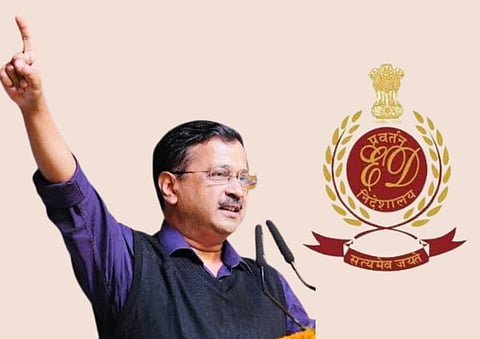
New Delhi: As the Delhi High Court has halted the release of Arvind Kejriwal, who is lodged in Tihar jail in connection with a money laundering case involving now-scrapped Delhi’s excise policy, vacation judge Niyay Bindu of Rouse Avenue Courts, while granting bail to the chief minister on June 21, came down heavily on the Enforcement Directorate (ED) — observing that the probing agency failed to give any direct evidence against the chief minister in respect of the proceeds of crime.
Vacation judge Niyay Bindu of Rouse Avenue Courts remarked that the ED was delaying the procurement of evidence, stating that the Central probing agency believed the existing evidence against Kejriwal was insufficient to proceed with the case.
The court also raised serious concerns about the ED’s stance regarding the credibility of the approvers. The agency had contended that “investigation is an art and sometimes one accused is given the lollipop of bail and pardon, induced with assurances to elicit their story behind the offense”.
The court interpreted this argument critically, stating that it cannot accept the notion that investigation is merely an art. It cautioned that if investigation is treated as such, it opens the possibility of implicating anyone and keeping them in custody by selectively procuring and omitting exculpatory evidence from the record.
This situation led the court to infer a bias on the part of the investigating agency in its actions. The court emphasized that the Enforcement Directorate (ED) should act promptly and fairly to ensure that it is perceived as adhering to the principles of natural justice.
The court noted that the ED did not address certain issues raised by Kejriwal, such as his absence from the CBI case or the ECIR FIR.
"Moreover, the accusations against the applicant emerged following statements made by specific co-accused. Additionally, it is an undisputed fact that the accused has not been summoned by the court to date, yet remains in judicial custody at the behest of the ED under the pretext of ongoing investigation," the court stated.
Furthermore, the judge pointed out that the ED has not presented any evidence to demonstrate that co-accused Vijay Nair was acting under the instructions of Kejriwal.
The judge also questioned how the ED intended to establish Kejriwal's guilt by highlighting the close relations between Vinod Chauhan and Charanpreet Singh, even if the chief minister knew both individuals.
"The ED has additionally failed to explain how it concluded that the one crore rupees seized from Vinod Chauhan constituted proceeds of the crime. Furthermore, the ED has not clarified how the alleged amount of forty crore rupees uncovered during the investigation is linked to criminal proceeds," stated the court.
Referring to the principle of "justice should not only be done but seen to be done", the judge remarked, "If an accused endures the injustices of the system until his innocence is recognized, he may never believe that 'JUSTICE' has truly been served in his favor."
The court noted that prima facie evidence establishing Kejriwal's guilt was lacking, leading to the grant of bail.
Significantly, today the ED petitioned the Delhi High Court to challenge Arvind Kejriwal's bail. The matter was urgently listed and is now before a vacation bench presided over by Justice Sudhir Kumar Jain.
The Delhi chief minister was apprehended by the ED on March 21. In May, the Supreme Court granted him temporary bail until June 1 due to the general elections. He surrendered on June 2.
You can also join our WhatsApp group to get premium and selected news of The Mooknayak on WhatsApp. Click here to join the WhatsApp group.